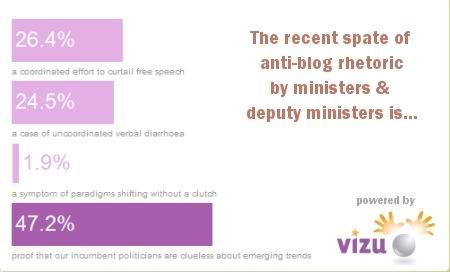Anti-blog Political Rhetoric Poll Results
Technorati tags: Opinion Poll, Poll Results, Blogging, Politics, Politicians, Malaysia
The poll closed this past weekend, and it appears that 47.2% of those who responded felt that our political leaders are pretty much out of touch with current trends, brought about by the democratization of public opinion through the Internet.
 Are our politicians not coping with a flattening world?
Are our politicians not coping with a flattening world?
It certainly is ironic that while, on the one hand, there is a lot of talk about advancing the use of the Internet in Malaysia, the political leadership hasn't come to grips with the implications. For one thing, the mainstream print press media is no longer the only avenue for news dissemination.
Perhaps another facet of this is not coming to grips with the fact that as politicians, whatever they say (whether nonsense or worthwile) can no longer go unchallenged. And perhaps this is the biggest perceived threat. That politicians, for the first time maybe, have to remember that they can't simply spew whatever crap that comes to mind and expect it to be swallowed wholesale.
Sure, it's easy to label dissatisfaction and criticism as being "anti-Government". Just as easy as it is for the citizens to label politicians as "anti-People", based on their words and action.
Walski thinks that, at the end of the day, it boils down to accountability, and the fact that politicians need to remember to whom they are accountable to.
(accountability and more, in the full post)
It's a known fact that once a politician is elected to Parliament, his or her expected allegiance is to the party, first and foremost. Even if the party line may sometimes be against the people's collective wishes. It's party first, and always. Or else.
And if the general party feeling is that blogs are anti-Government (or anti-Party - same difference sometimes), then all and sundry under the auspices of that party must spout the party line. We've seen politicians who've spoken out based on their own conscience being censured by the party whip.
This, too, gives some credence to the opinion of 26.4% thinking that the anti-blog rhetoric is a concerted effort to curtail free speech.
A close third place is 24.5% thinking that it's simply the politicians spouting crap. Verbal diarrhoea, in other words. In fact, this is related somewhat to politicians not being in touch with the realities of open-access information platforms made possible by Internet technology.
One voter actually understood what the fourth choice was (and no, it wasn't Walski) - that it's a symptom of paradigms shifting, and causing head-pain to those politicians who cannot cope with the changing paradigm. Again, this is related to what the majority of you voted.
So it seems clear, at least in the minds of those that voted, our politicians just do not know how to handle the freeing up of public sentiment. They don't like what they're hearing, and it's causing much discomfort.
Granted, everyone should verify whatever news or rumors they hear, before spreading them. And really, the role of the press in this age of freer opinionization, is to follow up on what the masses are saying. Not simply ignore what's being said, as has been suggested by some of our politicians and ministers.
There's usually no smoke without fire, and sometimes, as in the case of peat fires, all you see for a long time is just smoke. Until, of course, the fire breaks through to the surface, and all hell breaks loose.
To the politicians - take heed. The natives, as they say, are restless.
Very restless.
















